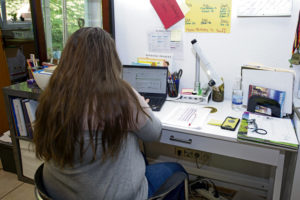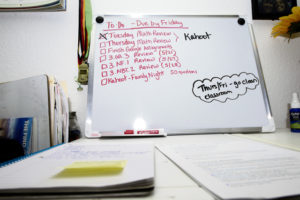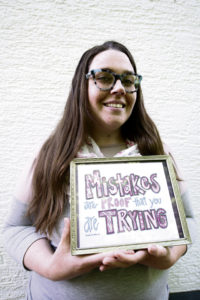At 8:20 a.m., the ringing bell signals the beginning of class at Kaiserslautern Elementary School. However, instead of shuffling to their desks to sit with friends, students are now at home seeing their teacher through a computer screen.
On March 13, the Department of Defense Education Activity announced schools would be closing indefinitely March 16 to help prevent the spread of coronavirus disease 2019 and would be switching to digital learning. Teachers were given time to prepare for a new format of learning.
It was unfamiliar and unusual but also exciting. For Shannon Blakely, third grade teacher, this was the beginning of a new adventure at her home.

“It’s a first for everyone,” Blakely said. “It was challenging, but we overcame it. We supported each other.”
Blakely starts virtual teaching in a way similar to how she would do so in person. At 8 a.m., she greets her students online and assigns work. Blakely assigns days of the week to meet students and has open office hours for students to ask questions if needed. Students are also able to view educational videos and read electronic versions of their textbooks for assignments.
As a result of the shift in learning, Blakely and other third grade school teachers collaborated and divided classwork among subjects to alleviate the workload. Blakely grades math assignments and provides additional conference sessions as needed.
“One of the biggest things we wanted is to make sure we didn’t overwhelm each other,” Blakely said. “My team is amazing.”

Initially, virtual schooling involved a lot of learning for teachers and students, but Blakely said flexibility has been the key to success.
“Young minds are molded very easily,” Blakely said. “They’re like sponges and they can learn new things with time and assistance. I feel like not just third grade, but all of DODEA has really adapted to using online resources in a positive way.”
Blakely hopes to take some of her digital lessons into the classroom when school resumes now that DODEA students are better trained on technology.
One of the struggles Blakely came across as virtual schooling progressed was students adjusting to their new lives.
“Kids want to talk,” Blakely said. “They miss the social atmosphere. And when you’re deep in your routines that’s hard.”
Together with other teachers they came up with ways to safely continue social activities. Blakely’s co-teacher, Joanne Lee, meets with students every morning to play games and warm-up for the school day, while Blakely devised “Fun Joke Friday” encouraging students to come up with their best joke to impress the class.
To help further remedy social concerns, Blakely created a mobile library. Blakely took physical books she had in her home and delivered them to the homes of her students around the area.

“I feel like I needed to provide that opportunity for my kids to not just read on the computer continuously,” Blakely said. “I wanted to make sure they didn’t lose the love of reading while we were doing digital learning.”
Blakely hopes to eventually deliver books to all of her students, and she has already received requests from students asking when she’s going to arrive again.
“Two of them were like, ‘I really want to give you a hug but I can’t,’” Blakely said. “It’s really hard. Just showing affection and love towards those kids means a lot. Those are just a few things they need on a daily basis.”
Tech Sgt. Joe Perkins, 86th Security Forces Squadron installation patrolman, praised Blakely for her digital teaching during COVID-19. In April, his son received books from her mobile library as well as a potted plant when she visited them.
“She has really gone above and beyond to help us parents,” Perkins said.
In the future, Blakely aims to be a teacher that students will contact for conversation or advice years down the road.
“Teachers aren’t in it for them, they’re in it for the kids, the families and the community,” Blakely said. “We want to make society a better place.”
Blakely sees COVID-19 not as an obstacle, but as a new challenge that will make society stronger than it was before.
“We’re all going to be better humans for having to take a step back and (physical) distance,” Blakely said. “I think each of us have had time to really think about our lives, our wants and our dreams.”


